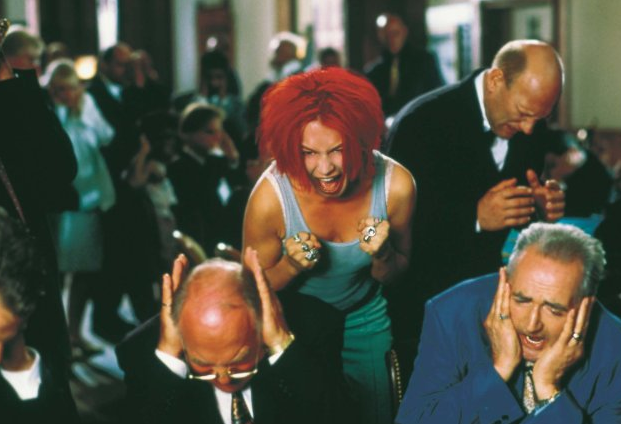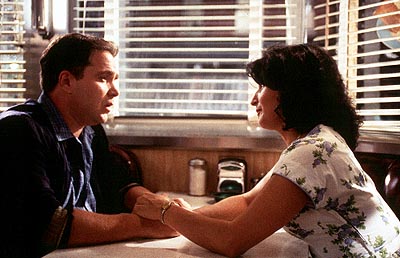
This morning I saw the new Johnny To movie “Revenge,” with none other than French crooner Johnny Hallyday. The film was wonderful; granted, it’s got its fair share of cliches but these sorts of films, about Hong Kong and Macau triads in all-out wars are the new Westerns. Justice, honor and respect are the order of the day. When a family is executed by a rival gang, revenge must be exacted.
To puts a premium on production values and his actors are sleeked out and decked out (sunglasses are de rigueur everywhere, whether indoors or under pouring rain). And yet the film is highly enjoyable, thrilling, even, as modern Westerns go. I highly recommend “Revenge.” 
Finally, sun and warm weather. My colleague from Germany even suggested going for a swim although I’m happy just sitting in darkened movie theatres and then going back to the press room. I am loading up on business news daily to see what’s happening in movie world. They’re making a sequel to “The Descent,’ have you heard? Also, Gaumont has set a new objective for itself: to make more English-language cinema (pictured: dir. Mia Hansen-Love, France)
more popular stories
There is grim sensuality about German cinema. Banal characters coexist on celluloid for us to take note and wonder how much worse their lives could get, and entertain, for a moment, the possibility that something extraordinary could happen to them. In Lola Rennt (Tom Tykwer; 1998) we are shown the lives of the gutless: a smug old woman pushing a stroller down a lonely corner,a homeless guy on the subway, and a young mug named Mani who is suddenly very, very hard up for cash. Such pathetic lives, all to become engulfed in the techno-thumping whir that Franka Potente brings with her. Berlin looks abandoned in Lola Rennt. Where are the people? Is it an element of German cinema to isolate characters and watch them as they writhe across the Potsdammer Platz?
In "Delirium," one of the shorts in Jim Jarmush’s “Coffee and Cigarettes” (2003) GZA and RZA, two members from the rap group Wu-Tang are sitting at a table in a diner, presumably late at night in some place urbanized and dreary—the entire film, in fact, seems to exist against a similar backdrop. GZA proclaims the benefits of drinking tea and avoidance of coffee and goes into an edifying rant about virtuous living, in a way-of-the-samurai-style lingo. For those who know a little about Staten-Island-based Wu-Tang, a spiritually-rich existence plied with copious amounts of martial arts is the sort of life they seek. Director Jarmush, who’s had close associations with Wu-Tang (he previously wrote and directed Ghost Dog (1999) with RZA on soundtrack duties; the narrative of Ghost Dog is peppered with references to Wu-Tang trivia, in fact) gives both men the leeway to contend for themselves.
Recently IFC began broadcasting Mike Leigh's "Secrets And Lies" (1996) again, giving us an opportunity at a second (or third, or fourth) look. Hortense Cumberbatch (Marianne Jean Baptiste) is a successful thirtysomething who longs for something--she's never met her biological mother (played by Brenda Blethyn) and was put up for adoption just after birth. Sometimes after the death of her adoptive parents, she sets about reclaiming a mother who is reluctant to link with her. This is all marvelously complicated by the fact that the young woman is black and born out of wedlock and the woman is white and very intent on erasing this stain on her personal life. One of the obvious ironies of the film, the fact that Cumberbatch has become a well-heeled member of society, isn't exploited lengthily by Leigh, thankfully. Still, the contrast between Cumberbatch's life in a sundrenched West End flat while her mother rots away in the back of an East London townhouse helps to put things into context. What's more, the old lass is overlooked by men and rejected by her daughter which underscores the need for the daughter to be reunited with her biological daughter. There's an overwhelming need for these two women to be together again and one naturally identifies with, no roots for, Cumberbatch as she tries to win her mother back. A little bit about technique: Leigh's camera shows an unobstructed view of the two womens' worlds as they slowly come together. We are forced to watch and it causes discomfort, such as the scene in the diner the day of mother's first encounter with daughter. Notice the camera firmly planted before the two women as they sit side-by-side. Why sit side by side? Is there anything human about mother and daugther reunited after 30, oh, 35 years, and sitting side-by-side. This is when film that fashions itself as unobtrusively realistic veers back into the realm of film within the film. By positioning the two subjects side-by-side during such a long moment, Leighs efficiently transfers the tension from that scene onto us.
What is it about those Italian-Americans in the movies? Italian-Americans make some of the best characters out there. Madone! I just saw Two-family House (De Felitta; 2000) starring Michael Rispoli (who later went on to play, as several other castmembers from Two-family House, in the Sopranos). Small world, the Italian-American world on celluloid. Marty Scorcese and Bob De Niro were especially instrumental in bringing them to the big screen in a big, commercial-success kind of way. Let me rephrase that: they were the most influencing ones.










